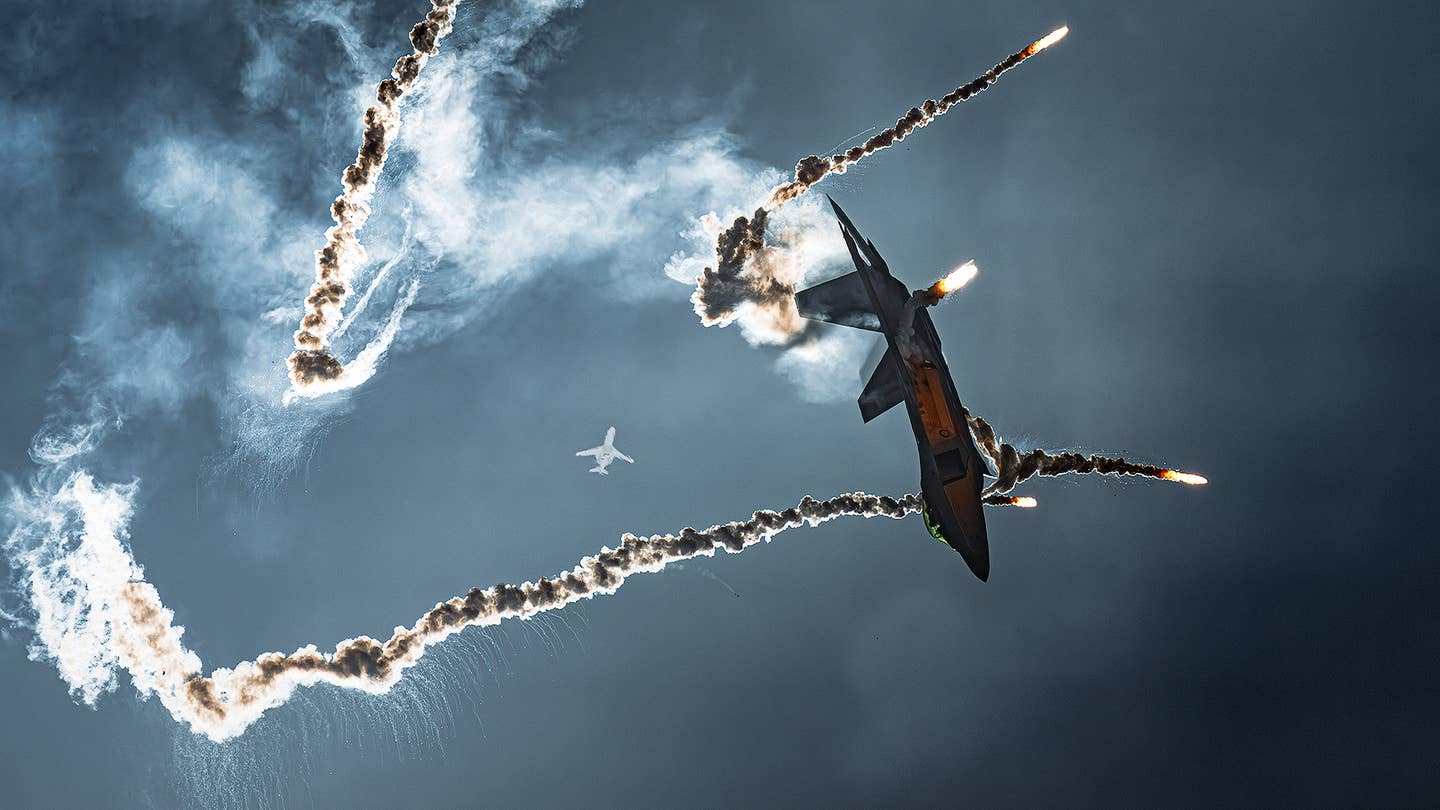The stunning image shows an F-22 spewing flares against incredible backlighting at the Pacific Air Show in Huntington Beach.

It’s pretty hard to get a bad picture of the F-22 Raptor, but getting a really, really good one is far harder. These jets are photographed at air shows throughout the year by the best aviation photographers on the planet, and they are anything but camera-shy when it comes to their global real-world operations. Yet one photographer attending the Pacific Air Show in Huntington Beach, California, recently took perhaps the best air show image of an F-22 we have seen, or at least one of the best.
The photograph in question, which features at the top of the article, was captured by Rohan Patel (@photo_rohan) on September 29. In it, an F-22 flown by the Air Force’s highly popular F-22 Raptor Demonstration Team releases infrared decoy flares during a post-stall maneuver under incredible backlighting, just as a business jet makes a cameo in the background.
Close-in perspective of the F-22 deploying flares. Rohan Patel
The deployment of expendable infrared countermeasures is a regular feature of military aerobatic routines around the globe, due to their eye-catching nature and ability to ‘punctuate’ certain dramatic maneuvers. But as we recently noted in relation to the Air Force’s F-35A Demonstration Team, the normal use of them for American military airshow acts is something new. This is true with the F-22 demo team, as well, with the Raptor’s post-stall capabilities — thanks to its thrust vectoring, enormous thrust, and huge control surfaces — really making the most out of them. You can see what we mean in the videos below:
The combination of the F-22’s vertical position, coupled with the dramatic lighting that illuminates the flares and the fine details of their trailing smoke, gives the photo a true sense of atmosphere and spectacle. Patel, who is a space mission design engineer at NASA’s Jet Propulsion Laboratory, offered us a detailed explanation of how he was able to capture the scene, using a Sony A7R IV DSLR paired with a Sony FE 200-600 telephoto lens, on the Huntington Beach shoreline:
“When the Raptor began its performance, the clouds were just starting to break over the show-center, but it was still mostly cloudy out on the horizon and towards show-left. This posed a bit of a challenge as low passes and turns had significantly different lighting conditions than when the jet went vertical. I set up the camera for the optimal settings when the aircraft was in the shade. I only opted to change the shutter speed, and leverage the backlighting, to capture flare details when it went vertical. A very fast shutter speed allowed for both the Raptor and the flares to be frozen in the frame; the backlighting helped to emphasize the bits and pieces of the flare canisters and the trailing smoke.”
Moreover, Patel was equally candid in his appreciation for the F-22 when speaking to us:
“The F-22 Raptor has always been one of my favorite military aircraft and this was the first time I’d seen it perform at an airshow. That being said, I was very excited to finally see the Raptor in its element, but at the same time, I was focused behind the camera. It can be difficult to appreciate the performance in real time as you’re concentrating on composition or changing settings to nail the shot. In the moment, I did see there was a second airplane in the frame, but I didn’t have time to review the shot. The performance kept going and I didn’t want to miss other opportunities. It was while reviewing the images after the fact, when I began to appreciate all the little details captured and how I was quite lucky with this frame. The show can be overwhelming to the senses and small intricacies often go unnoticed. Thankfully, still images freeze the moment indefinitely and help me relive it whenever I want. This is the main reason I am a photographer.”
You can check out the F-22 Raptor Demo Team’s full display at the Huntington Beach Air Show, where the image was taken, in the awesome video below:
The Air Force is ultimately looking to replace its F-22s with a new sixth-generation stealth combat jet in the long term, which is currently being developed under the Next Generation Air Dominance (NGAD) program. The service’s total number of Raptors is also set to decrease in the near term, too. As we’ve noted before, the Air Force’s 2024 Fiscal Year budget request indicates it wants to divest 32 Block 20 F-22A Raptor stealth fighters (currently tasked with training and other non-combat duties). This would reduce the total size of the F-22 fleet from 183 to 151 aircraft.
However, despite these plans, the F-22 very much remains the ‘centerpiece’ aircraft within the USAF’s inventory and will see continued upgrades in the coming years. They are also being used to trial NGAD capabilities, and will eventually receive technologies from said program.
Our thanks to Rohan Patel for allowing us to share his wonderful F-22 photography. Be sure to check out his Instagram page, which features a range of beautiful aviation images.



